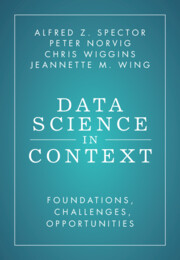Book contents
- Data Science in Context
- Reviews
- Data Science in Context
- Copyright page
- Contents
- Figures
- Tables
- Preface
- Acknowledgments
- Introduction
- Part I Data Science
- Chapter 1 Foundations of Data Science
- Chapter 2 Data Science Is Transdisciplinary
- Chapter 3 A Framework for Ethical Considerations
- Recap of Part I: Data Science
- Part II Applying Data Science
- Part III Challenges in Applying Data Science
- Part IV Addressing Concerns
- Chapter 20 Concluding Thoughts
- Appendix Summary of Recommendations from Part IV
- About the Authors
- References
- Index
Chapter 3 - A Framework for Ethical Considerations
from Part I - Data Science
Published online by Cambridge University Press: 29 September 2022
- Data Science in Context
- Reviews
- Data Science in Context
- Copyright page
- Contents
- Figures
- Tables
- Preface
- Acknowledgments
- Introduction
- Part I Data Science
- Chapter 1 Foundations of Data Science
- Chapter 2 Data Science Is Transdisciplinary
- Chapter 3 A Framework for Ethical Considerations
- Recap of Part I: Data Science
- Part II Applying Data Science
- Part III Challenges in Applying Data Science
- Part IV Addressing Concerns
- Chapter 20 Concluding Thoughts
- Appendix Summary of Recommendations from Part IV
- About the Authors
- References
- Index
Summary
This chapter introduces ethical principles that help us better use data science to achieve beneficial societal goals. As with all developing technologies, data science can give rise to unanticipated negative consequences, and it may affect our professional, personal, and political realities. These challenge our norms for how we use technology in ways consistent with our values. Many scholars, educators, and technology companies refer to these as ethical challenges, building on the applied ethics tradition from basic sciences.
Information
- Type
- Chapter
- Information
- Data Science in ContextFoundations, Challenges, Opportunities, pp. 37 - 40Publisher: Cambridge University PressPrint publication year: 2022
